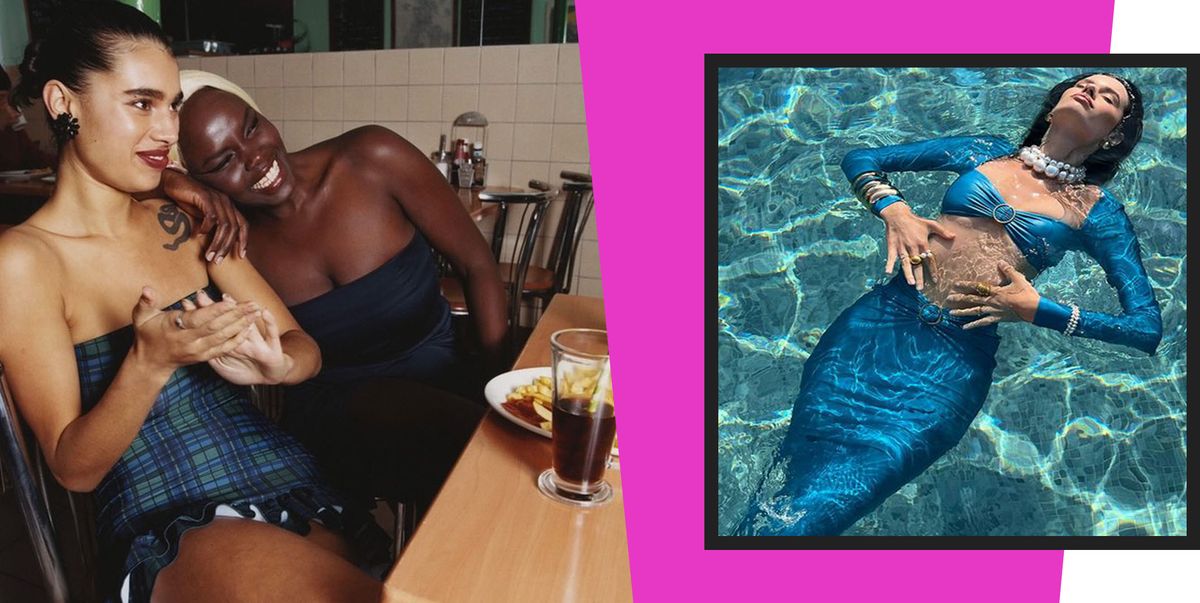We earn a commission for products purchased through some links in this article.
Peachy Den
Peachy Den was launched in 2019 by London-born Isabella Weatherby when she was fresh out of university. Fast forward four years and she’s found herself on the Forbes 30 Under 30 list thanks to the label’s global success and seven-figure profits.
This popularity comes as no surprise: Peachy Den was championing the Noughties before it hit the mainstream, and counts celebrities like like Bella Hadid, Addison Rae and Olivia Rodrigo as fans.
What’s more, the label prides itself on using mainly sustainably sourced or deadstock fabrics and producing 50% of its clothing in UK-based factories.
Pink City Prints

Pink City Prints is a British brand that celebrates ancient craft — founder Molly Russel launched the label in 2018 after a stint living in Jaipur.
All of the block and screen printing, hand-looming and embroidery is done by a network of artisans in Northern India (each dress can take up to three days to create).
The brand’s sales have doubled post-pandemic and it’s recently garnered lots of insider interest thanks to its Prairie-inspired and Victoriana cuts; the peplums, high ruffs and peasant sleeves create a striking silhouette.
Damson Madder

Despite launching smack bang in the middle of lockdown in April 2020, Damson Madder has seen huge success in its three years of existence. Putting sustainability at the forefront of everything it does, the British brand uses only organic or recycled cottons, and polyster yarns regnerated completely from plastic bottles.
Luckily, the label’s founder manages this alongside keeping price points affordable and designs as impeccable as ever. This season we’re obsessed with the ‘Golden Hour’ capsule, featuring vibrant co-ords with broderie anglaise details, plus tropical and leopard print swimsuits that are ideal for holiday dressing.
Advertisement – Continue Reading Below
Sister Jane

Sister Jane launched in 2011, first landing in stores as a concession in #OldTopshop’s iconic Oxford Street flagship. The London-based label launched its own site two years later and sales are rising rapidly, according to Forbes.
Beloved since day one for its dedicated retro aesthetic that never bows to cyclical trends, Sister Jane has been a go-to for babydoll silhouettes and voluminous puffed sleeves long before you started wishlisting Cecile Bahsen and Molly Goddard bits. The luxe cloqué fabrics, intricate embellishment and structural linings makes these pieces feel so much more expensive than they really are.
Rixo

Rixo needs no introduction. The British brand is the brainchild of best friends Orlagh and Henrietta, who bonded over their love for vintage shopping while studying at London College of Fashion.
Together they dreamt up Rixo — now a globally successful brand worn by The Princess of Wales and Hailey Bieber — from their university flat. They might have since moved on from student digs to an atelier, but Orlagh still hand-paints all of the original prints that grace their cult dresses.
Jigsaw x Roksanda

After a sell-out AW23 collaboration, Roksanda Ilinčić has teamed up with beloved high-street label Jigsaw on a second – and final –capsule for SS24.
Available to shop online and in select Jigsaw stores now, the 12-piece lineup exudes the same off-kilter elegance that made Ilinčić world-famous: it’s packed with rich, mixed-media textures, saturated hues and architectural cuts.
With prices ranging from £225 to £495 (for the glorious, red silk maxi dress), it’s inevitable that this collection will be going fast – grab a piece of fashion collab history while you can.
Advertisement – Continue Reading Below
Nobody’s Child

By now you will have likely heard of London-based brand Nobody’s Child. The label launched in 2015 and was one of the first to champion sustainable clothing at accessible prices — right around the time British high street favourites were turning more and more to fast fashion methods.
Nine years later and Nobody’s Child has upped both its fashion and eco-credentials. In line with its SS24 collection, the brand launched its Digital Product Passport (DPP) as a QR code on the care label of each of the capsule’s 20 pieces. This way, customers can scan to know details of the product’s supply chain.
Nobody’s Child plans to make this available on all garments in the main collection by the end of 2024, while maintaining its dedication to using over 95% organic, lower impact or recycled materials.
Omnes
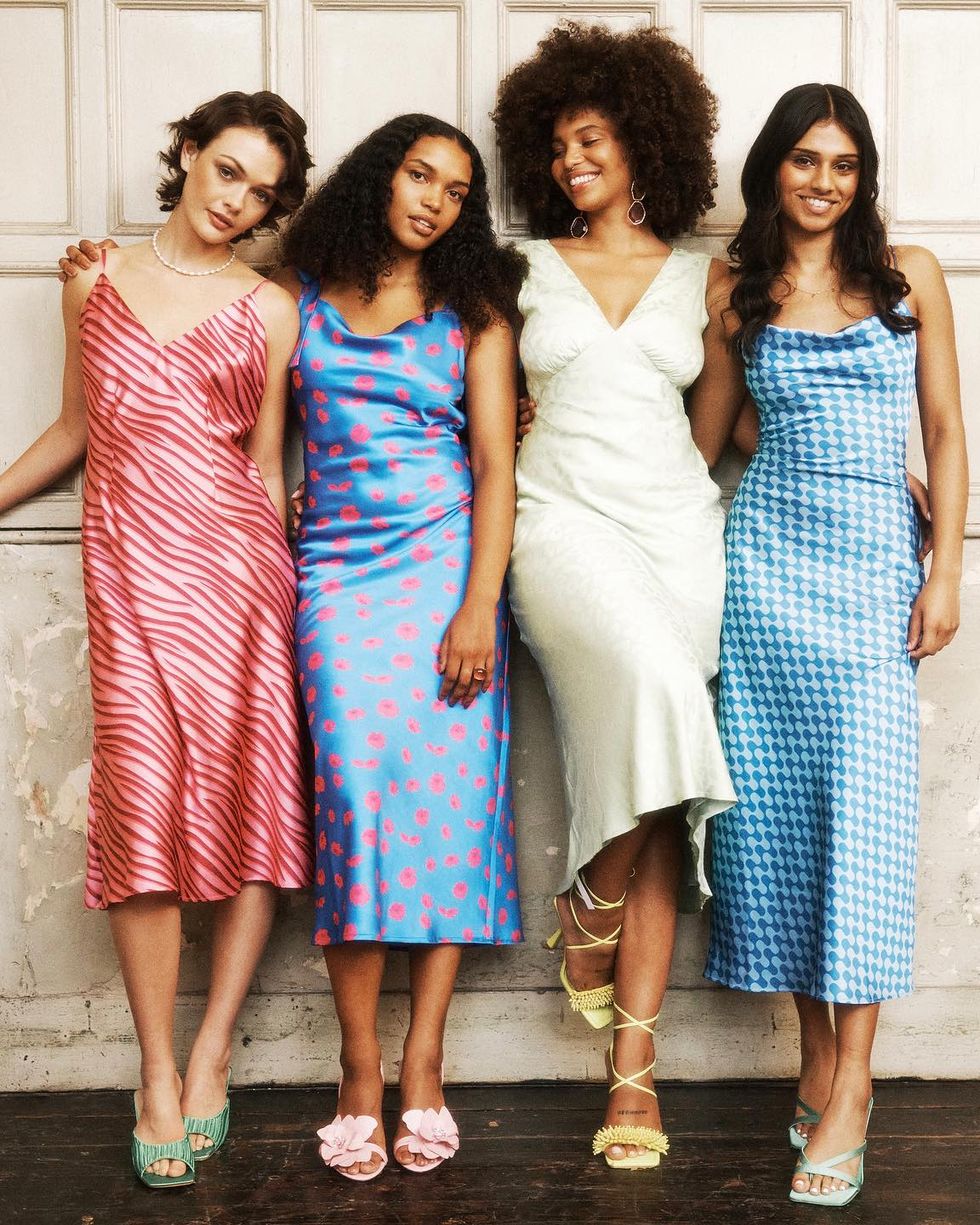
Another sustainably-led British brand to have on your radar is Omnes. Launching in 2020, the label has stuck to its guns in the past three years; creating small collections made entirely from deadstock and recycled fabrics.
The team thinks about aftercare too, sourcing fabrics made from the same yarn throughout to ensure ease of recycling at the end of life. Omnes’ signature look is the bias-cut, cowl-neck slip — a flattering and timeless silhouette that paved the way for its recent eveningwear collaboration with actor Naomie Harris OBE.
Albaray

Albaray is the brainchild of ex-Warehouse executives and designers Karen Peacock, Paula Stewart and Kirstie Di Stazio. The trio hit pause on their fashion careers during the pandemic in 2020 (and after Warehouse was bought by Boohoo), coming together over Zoom to launch now-beloved independent British brand Albaray.
From its 100% responsible sourced fabrics to recycled packaging, the label is proudly sustainable, and we’re big fans of its knitted dresses, tailored separates and plush wrap coats.
This season, the brand collaborated with Dorset-based artist Wilder & Wren on a 9-piece capsule of floral-print dresses, skirts, and tops that are ideal for summer occasions.
Advertisement – Continue Reading Below
O Pioneers
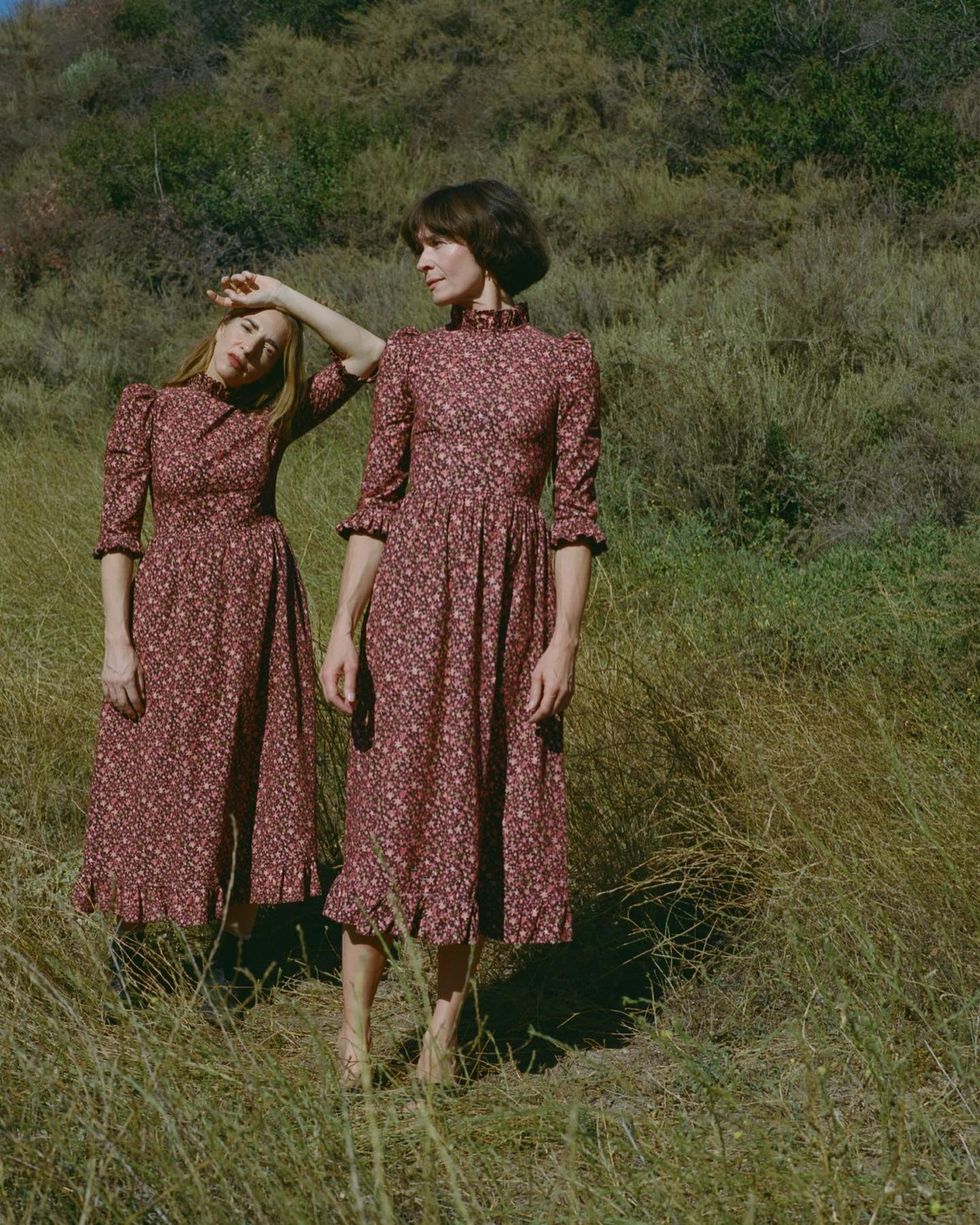
O Pioneers was founded in Camden by friends and fellow vintage-obsessives Clara Francis (actor and jewellery designer) and Tania Hindmarch (PR and seamstress).
The premise of the British brand is simple. A small collection of romantic, prairie-inspired dresses made from heritage end-of-stock fabrics; which just so happen to be both beautiful and sustainable.
Whether made from poplin or pin-corduroy, these numbers are often cotton and and machine washable — practicality is also a big factor for the duo.
Oceanus
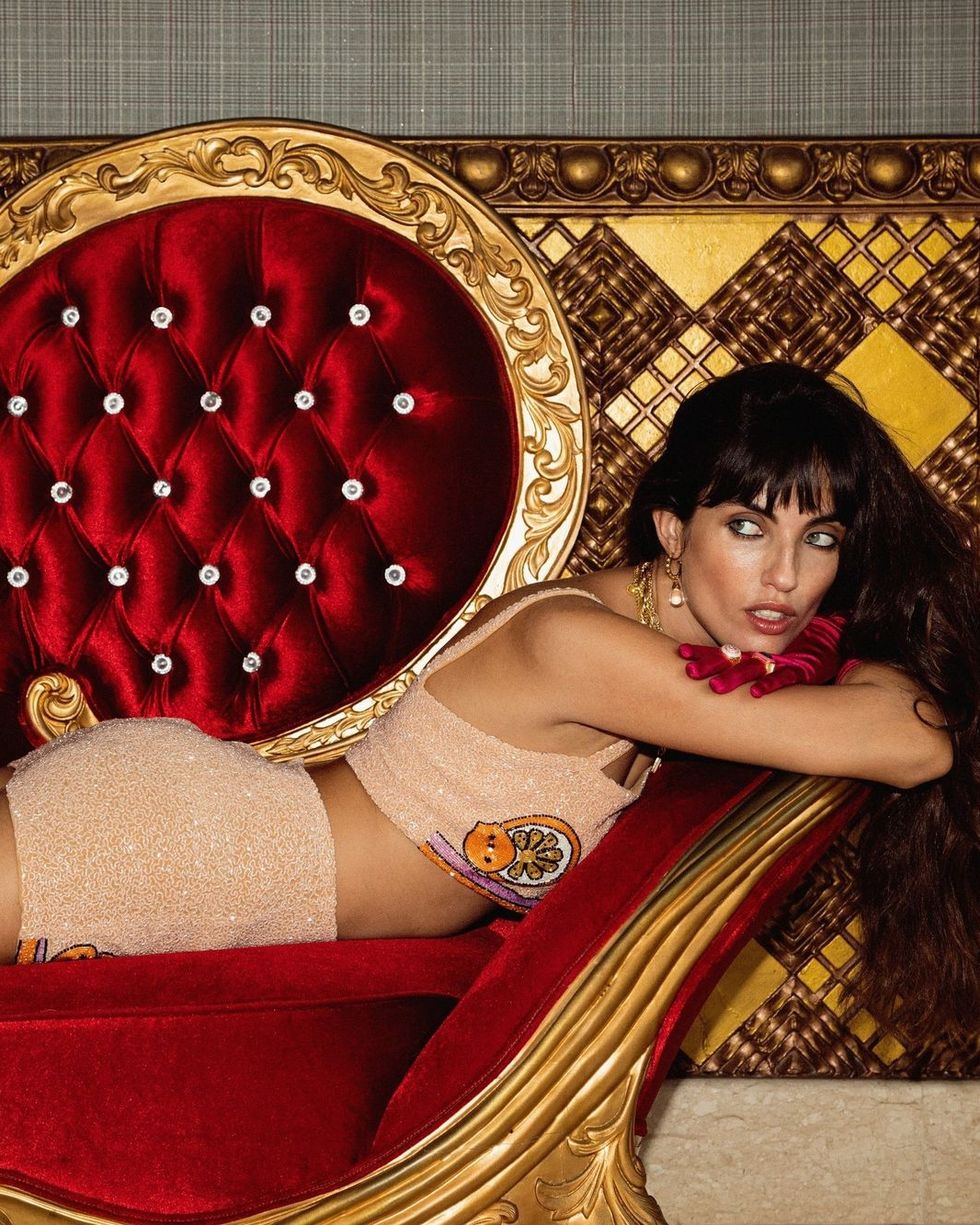
Oceanus first launched in 2017 as a swimwear brand. But not just any standard swimwear label — the late-Eighties and early-Nineties Miami influences (think old school Versace vibes) and atmospheric campaigns felt directional from day one.
Fast forward to 2024, and the British brand has expanded beyond resortwear into evening looks, but its retro aesthetic very much remains. Think bejewelled stretch-velvet, printed lamé, playful tropical and nautical motifs, with a heavy dose of sequins, beading and embroidery; alongside halter and square necklines, ultra-high leg shapes and plenty of sultry cutouts.
Cefinn

Ex-Smythson creative director Samantha Cameron (yes, the same Sam Cam you’re thinking of) launched Cefinn in 2017. The British brand quickly built a loyal customer base and having tried its clothes we can guess why: the fit is impeccable.
The words ‘for real women’ are thrown around A LOT in fashion, but this stuff is actually designed with day-to-day life in mind; not to mention it flatters a diverse range of bodies. Our favourite piece ever has to be the corduroy Daphne dress — it’s like the wearable, more affordable version of The Vampire’s Wife’s party looks.
Advertisement – Continue Reading Below
Really Wild Clothing
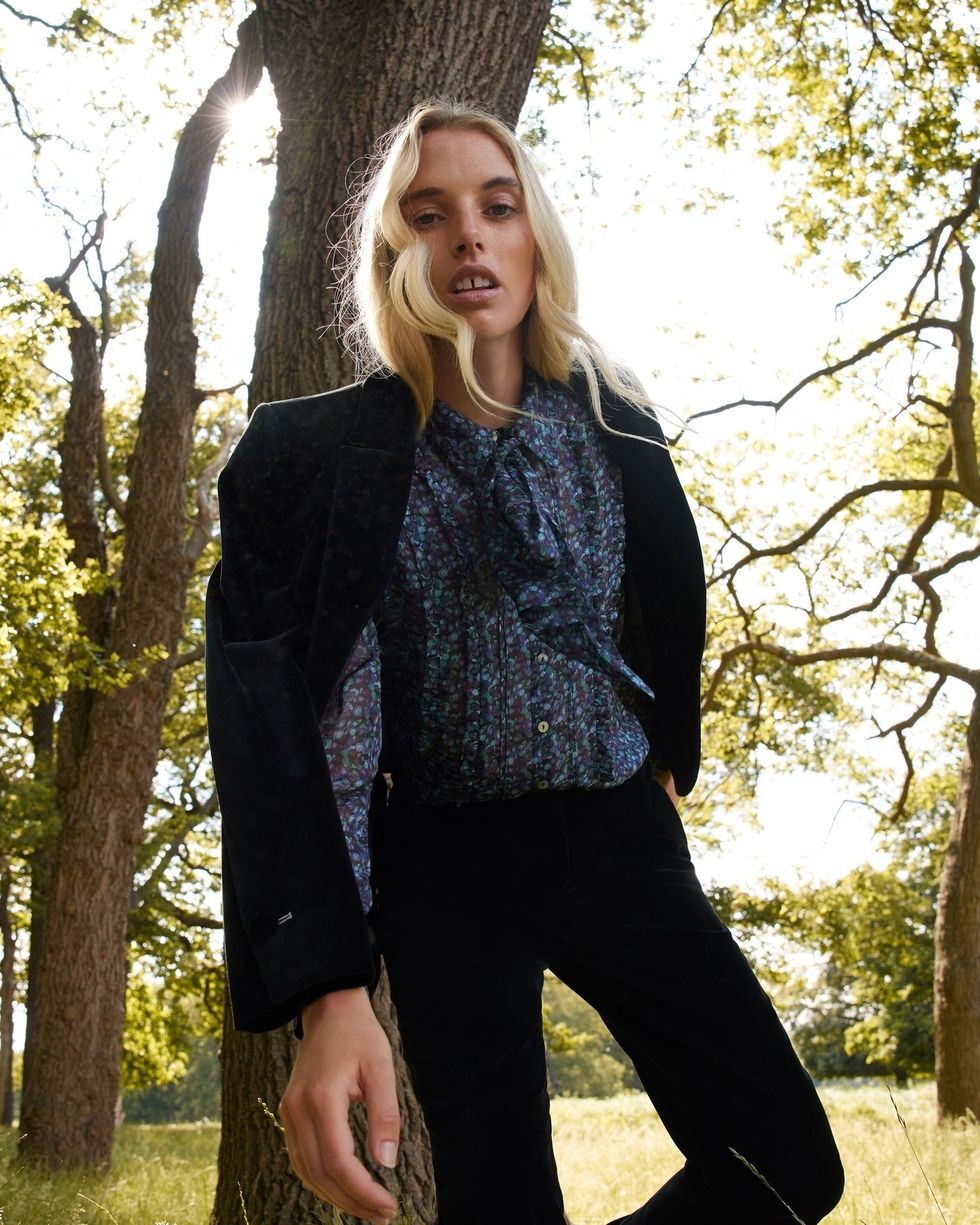
Natalie Lake was 40 when she pivoted from interior design to fashion design, proving that it’s never to late to pursue a career change.
Really Wild Clothing was born in 2002 with a focus on heritage fabrics and silhouettes (Lake loves the British countryside) that translate in the city, too. The result is a delicious mix of belted tweed blazers, whimsical florals, Seventies-inspired tailoring and silk separates. No wonder Kate Middleton, the Princess of Wales, has been championing the brand for two decades.
Khanum’s
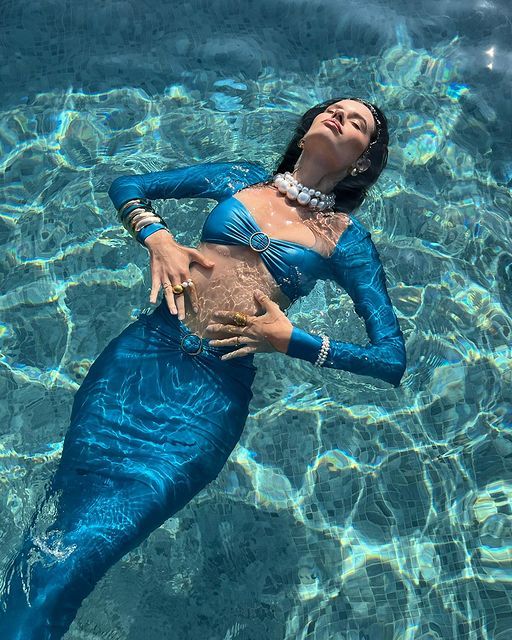
Khanum’s is a little different to the others in this edit — by which we mean this British brand is unabashedly and unapologetically glam.
Founder Rokeya Khanum takes inspiration from her Bangladeshi heritage and her culture’s love of OTT embroidery and embellishment when hand-creating pieces in her London studio.
That’s right: from the floor-sweeping gowns and cutouts minis to ornate wedding suits, everything you browse is made to order here in the capital. This is slow fashion in its truest and chicest form.
Lily and Lionel
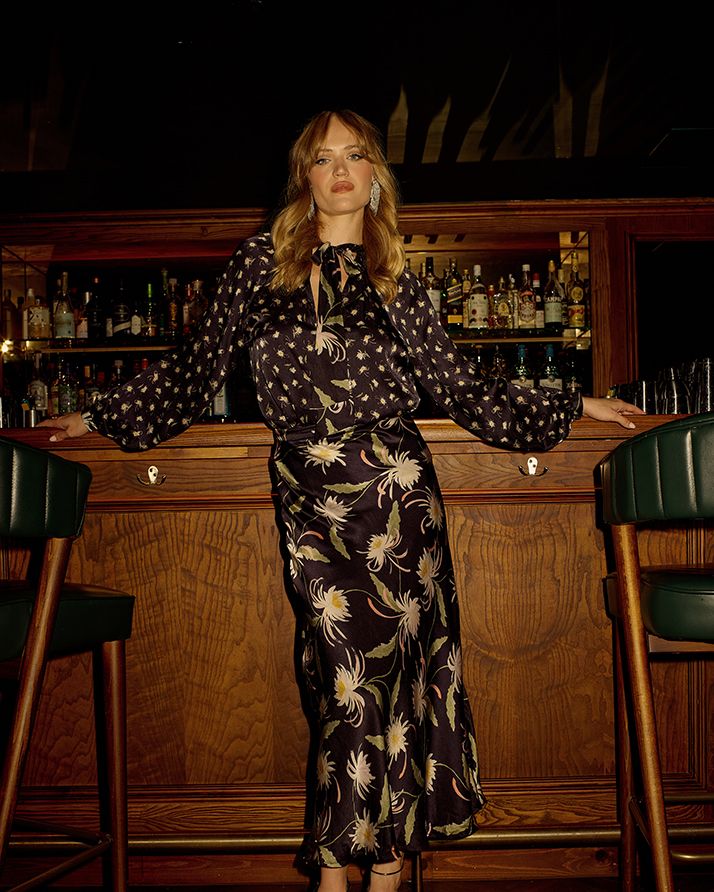
Lily and Lionel has evolved since its initial launch in 2008 — from a scarf brand, to a dedicated print house, to the womenswear label we know and love today.
Prints are still at the heart of Lily and Lionel, with each individual design being hand-drawn in the brand’s London studio; they help bring each vintage-inspired collection to life.
Advertisement – Continue Reading Below
Jane Atelier
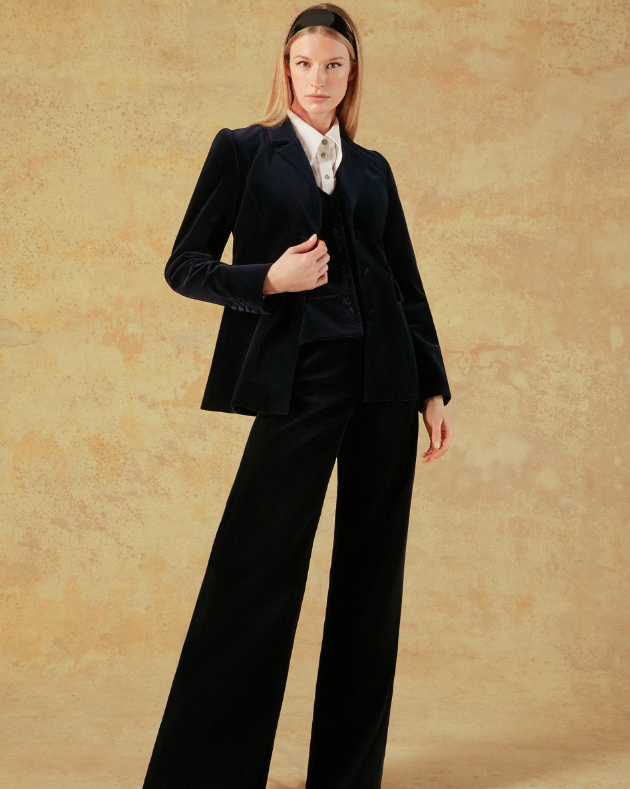
Jane Atelier has actually been kicking around for 20 years, but it was actually known as GOAT until rebranding in 2021. Founder and Creative Director Jane Lewis lives and breathes her label’s Sixties aesthetic – she’s rarely seen without her hoop earrings and point collar shirts.
The designer’s dedication to these retro shapes (we’re obsessed in particular with its three-piece suits) is no doubt why Jane Atelier has garnered such a loyal following – it counts Victoria Beckham, Lana del Rey, Gwyneth Paltrow and Kate Middleton, The Princess of Wales, among its clientele.
House of Sunny
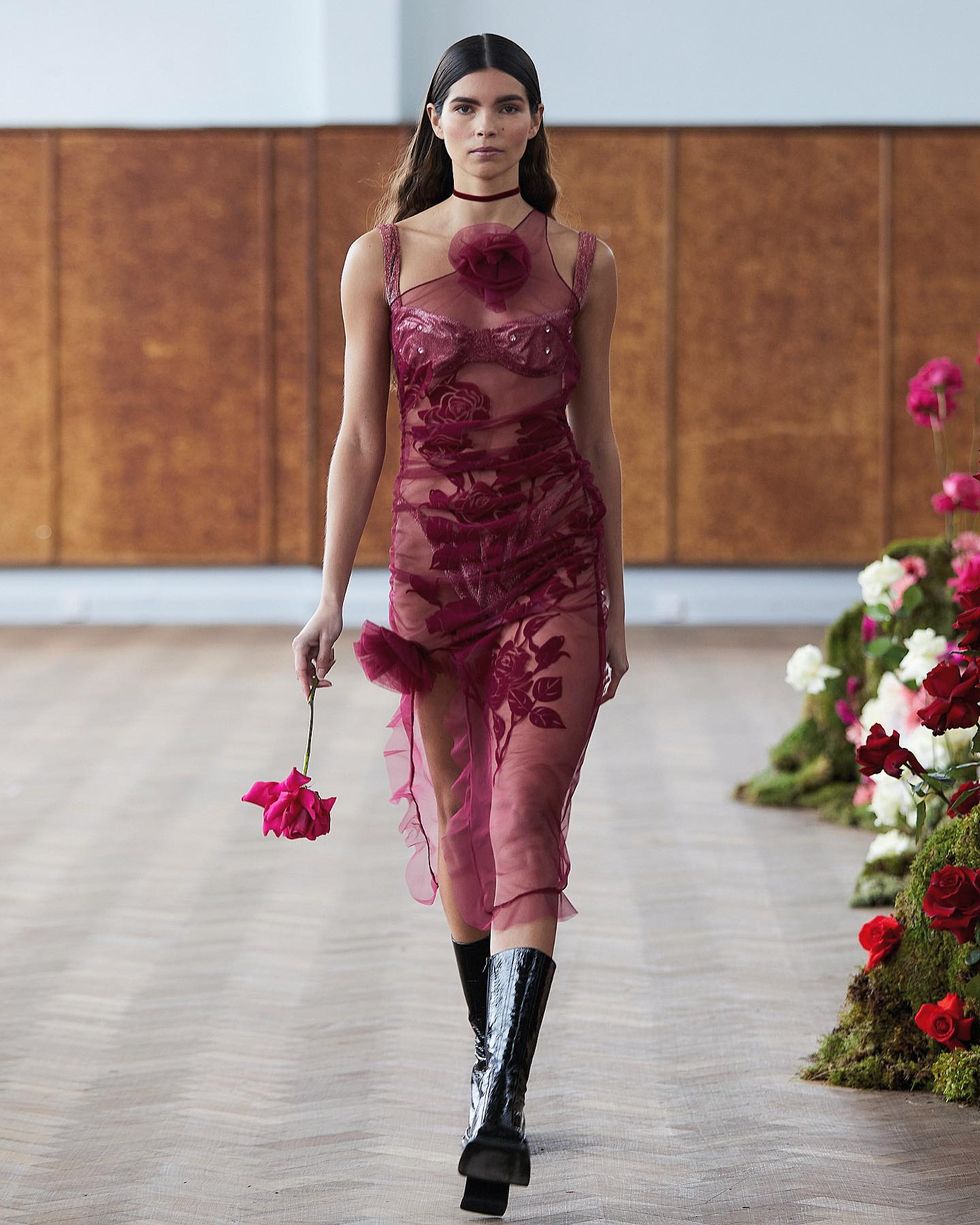
House of Sunny hit the big time in 2020 when its now-cult Hockney dress — loved by Kendall Jenner — became a sell-out success. You might not know this, but the British brand was actually launched in Hackney back in 2011.
Skip to 2024 and the label is expanding beyond its graphic knits priced under £150. For Autumn/Winter 2023 we saw House of Sunny take to the runway with a grown-up Unisex offering of sheer evening dresses, fringed leather jackets and Noughties-inspired maxi skirts — and we can’t wait to see what’s next.
Fanfare Label
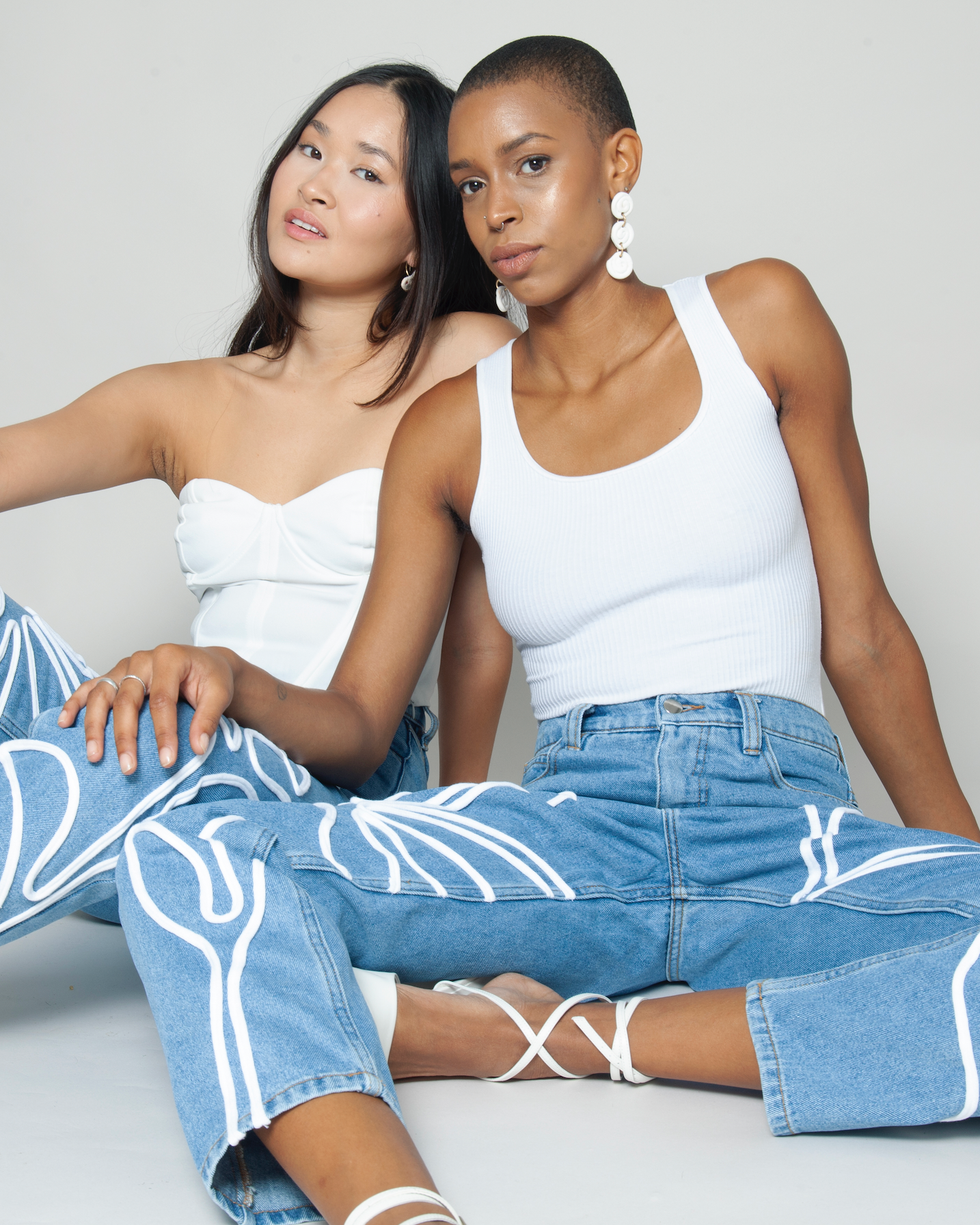
Revolutionising the way we perceive sustainable fashion, Esther Knight founded London-based Fanfare Label in 2019. Since then, it has quickly become a champion for circularity — winning multiple awards while remaining an independent brand.
Coveted for its eclectic denim with an exceptional fit, Fanfare ensures that each garment is either made slowly from certified sustainable fabrics, or crafted from upcycled textiles that would have otherwise gone to landfill. And it’s not limited to denim, the brand also offers linen sets, tees, and jackets for a head-to-toe conscious look.
Advertisement – Continue Reading Below
Scarlett Gasque
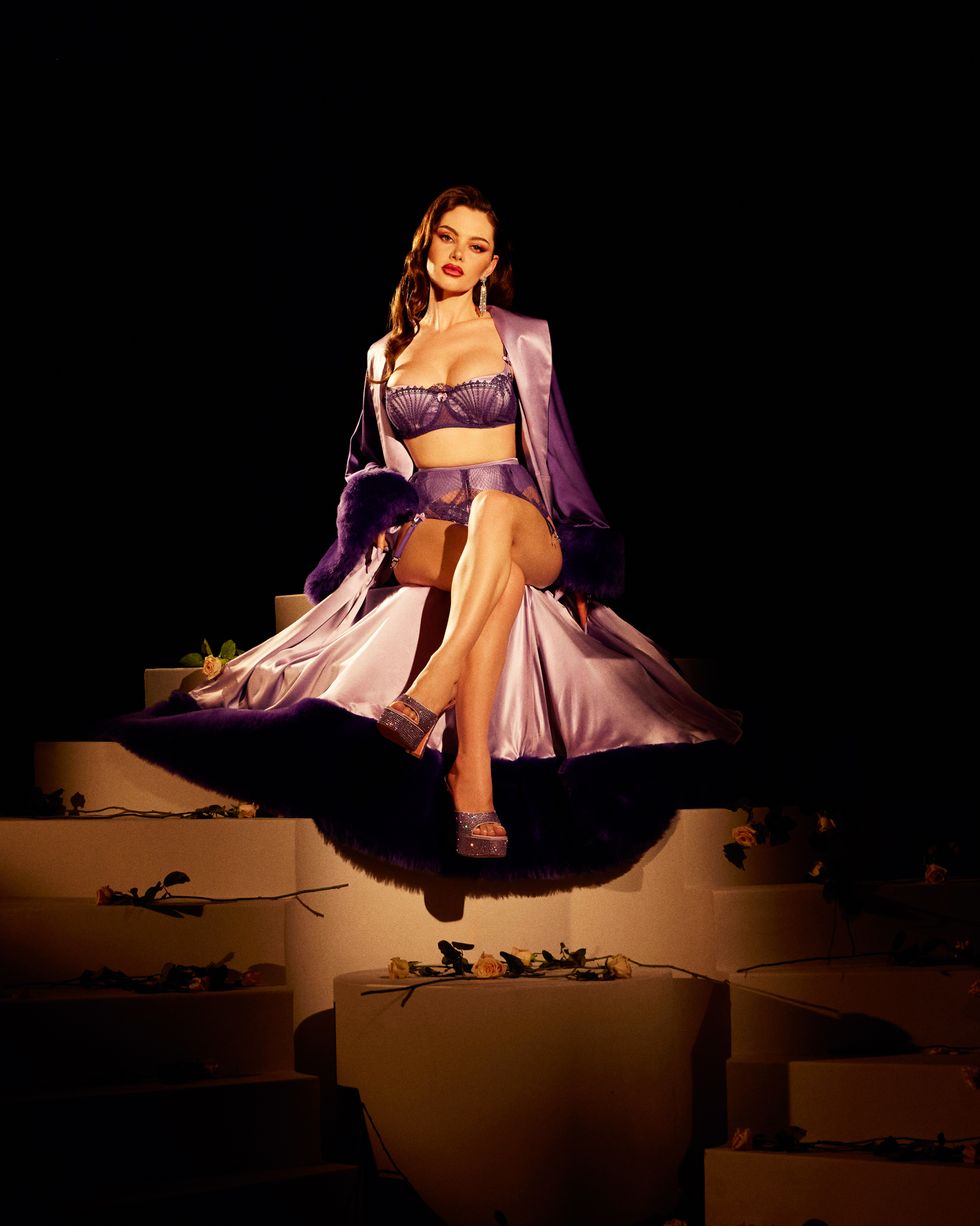
Scarlett Gasque might technically be a lingerie brand, but we’ve never seen underwear so deserving of being shown off outside the house.
Plus, fashion’s current obsession with all things Y2k has brought back the corset in full force and the British brand’s offering of expertly-boned pieces is not to be missed. We’d definitely wear one of the faux fur-trimmed robes as outwear, too.
The label’s Canadian-born founder Chloé Rogers studied Fashion History at Central Saint Martins – and what’s more British than that?
Laura Ashley

We’ve always been big fans of browsing vintage Laura Ashley via eBay or Etsy, until the beloved brand relaunched its official womenswear collection on 28 April.
The new era of Laura Ashley celebrates the archival textiles that the label started working with in 1953, and the original Seventies silhouettes which form its signature aesthetic. If you’ve been bookmarking floral prairie dresses, you can cease searching.
Watch Next
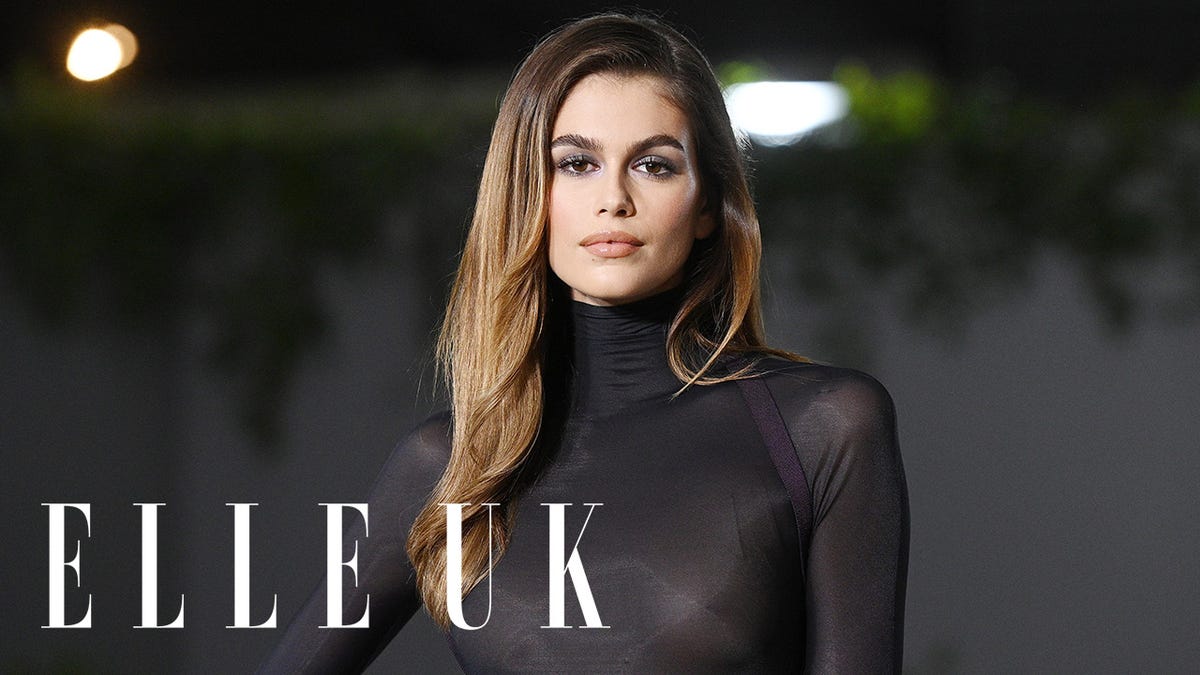
Advertisement – Continue Reading Below
Advertisement – Continue Reading Below
Advertisement – Continue Reading Below

